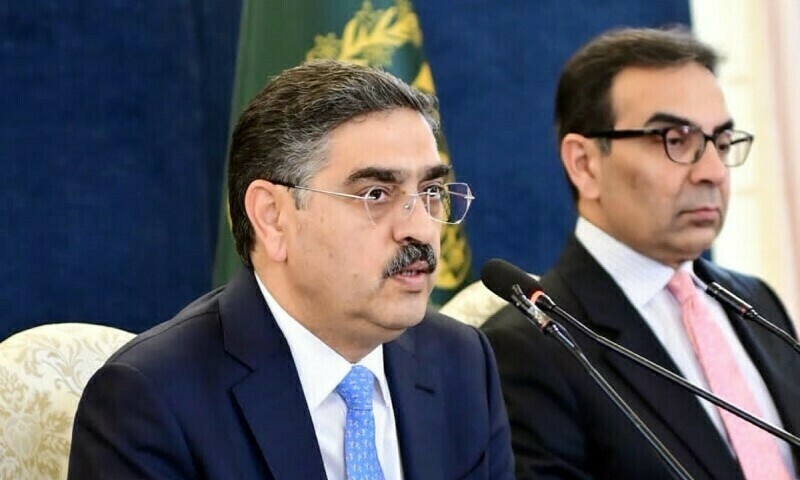• Says judges, armed forces do not enjoy free electricity
• Kakar promises relief in future bills
• Says ECP enjoys authority to announce poll date, caretakers can only assist it
• IMF urged to help Pakistan uphold right to electricity
ISLAMABAD: As the nation grapples with bloated power bills and backbreaking inflation, interim Prime Minister Anwaarul Haq Kakar told people to pay their utility bills since there was no way around it, adding that negotiations with global lenders on the issue were underway.
Speaking to journalists on Thursday at the Prime Minister’s House, Mr Kakar blamed successive governments over the past 30 years for the economic mess and announced that a plan was being devised to reform agriculture, minerals, information technology, and textile sectors. He claimed there were minerals worth $5 trillion in Balochistan.
He also made a new promise to power consumers, saying the government would announce a relief package regarding future consumption of electricity. “We will announce a relief package for electricity consumers in two days, but I cannot share its details because people will start criticising us if we cannot fulfil our promise for any reason,” the premier said.
The statement ended a week-long uncertainty which was fuelled by his own remarks as well as his ministers’ who had promised ‘immediate’ relief.
A day earlier, interim Finance Minister Shamshad Akhtar ruled out any relief and blamed IMF agreements for this.
It may be noted that a large number of people had missed the deadline for electricity bills, waiting for some relief measure, due to the promises of relief made by the government.
Speaking about the agreement with IMF, the interim PM said the government would fulfil Pakistan’s agreements with multi-financial institutions “at any cost” and would not allow any deviation in this regard.
“We have no ulterior motive, plan or larger-than-life grand ambitions for which we are speaking here,” he said. “It is not like oppressive rulers have come to power and are sucking the blood of the poor. “If someone is thinking like this, then they must shun this thought,” he said.
Power sector issues
PM Kakar recalled that in the 90s, load-shedding came forth as a challenging problem and governments entered into contracts with independent power producers (IPPs) to increase power production.
“But we did not realise the repercussions of those contracts which included paying a surcharge,” he said, pointing out that there were problems in transmission systems and the bill recovery process. The prime minister noted that while power bills were being burnt in one part of a city, electricity of around 200mw to 400mw was being pilfered.
“When our population was growing, we did not realise that our power structure remained dependent on fossil fuels and imported fuel. Whatever we were doing was on foreign reserves [in dollars] and that is impacting our other governance aspects.”
Who uses free electricity?
PM Kakar said an investigation was underway on reports of free units being used by some sections, asserting that things being said on social media couldn’t be considered “gospel truth”. “If someone tells me here that [electricity] units of judges, generals, and Wapda employees are free, should I accept that? We have to officially inquire about the factual position. It is mixed.”
He said the military informed him that they do not consume a single free unit while same was the case with the air force and the navy. “They pay from their own budget, which is their allocated budgetary position,” PM Kakar said.
Even in the judiciary, he continued, the consumption of free units was not the same as what was being portrayed on social media. The premier said only Wapda employees were entitled to free units, especially officers from grades 17 to 22. He said the government has made a plan under which the facility of free electricity will be given to Wapda employees having grade 16 and below while officials serving in grade 17 and above will not have this privilege. “…we are mulling over policy options and will come up with a policy within 48 hours,” he added.
It may be noted that in February, JI Senator Mushtaq Ahmad, on a point of order, revealed in the upper house that a retired judge gets around 2,000 free electricity units and 300 litres of fuel among other perks and privileges.
Stance on polls

Speaking about general elections, the caretaker PM said the government will only assist the Election Commission of Pakistan in holding the next general elections and all powers to fix date of the elections rested with the ECP. He said if the Supreme Court gave any directives regarding elections, the government would act accordingly.
“Recently, the law ministry has given its opinion [to president] that only the ECP can fix the date of the elections,” he added.
Talking about the increasing wave of terrorism in the country, the caretaker PM said after the United States troops left Afghanistan, militants have become stronger. “They have grabbed military equipment of the US forces and now using them against Pakistani security forces. But we have firm determination that they have to surrender otherwise will fight till the last militant on our soil,” he added.
‘Right to electricity’
Meanwhile, the New York-based Human Rights Watch (HRW) said that IMF should help Pakistan “uphold the right to electricity”.
In a statement, HRW’s senior counsel for its Asia division, Saroop Ijaz, noted that successive Pakistani governments “have failed to reform the country’s energy sector, which has contributed to the crisis”.
“However, the present price hike is part of a US$3 billion deal between the International Monetary Fund (IMF) and Pakistan, approved in July 2022, that mandates the government remove energy and fuel subsidies and move to a market-based exchange rate, as well as increase taxes.”
Published in Dawn, September 1st, 2023
















































Dear visitor, the comments section is undergoing an overhaul and will return soon.